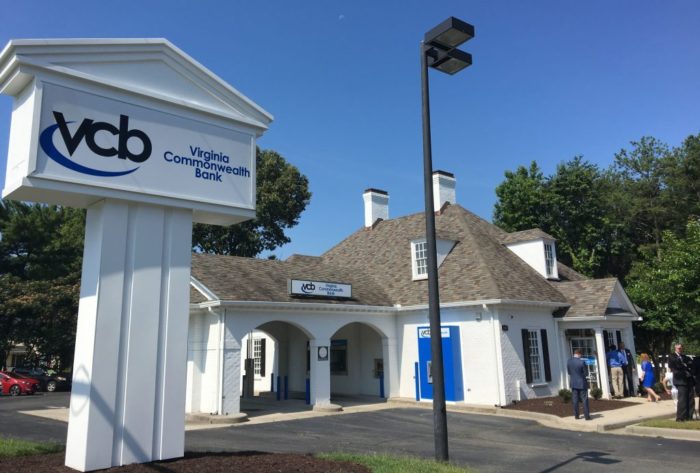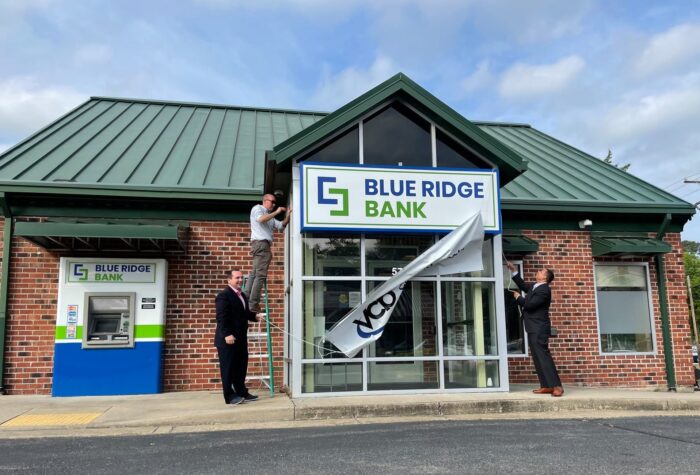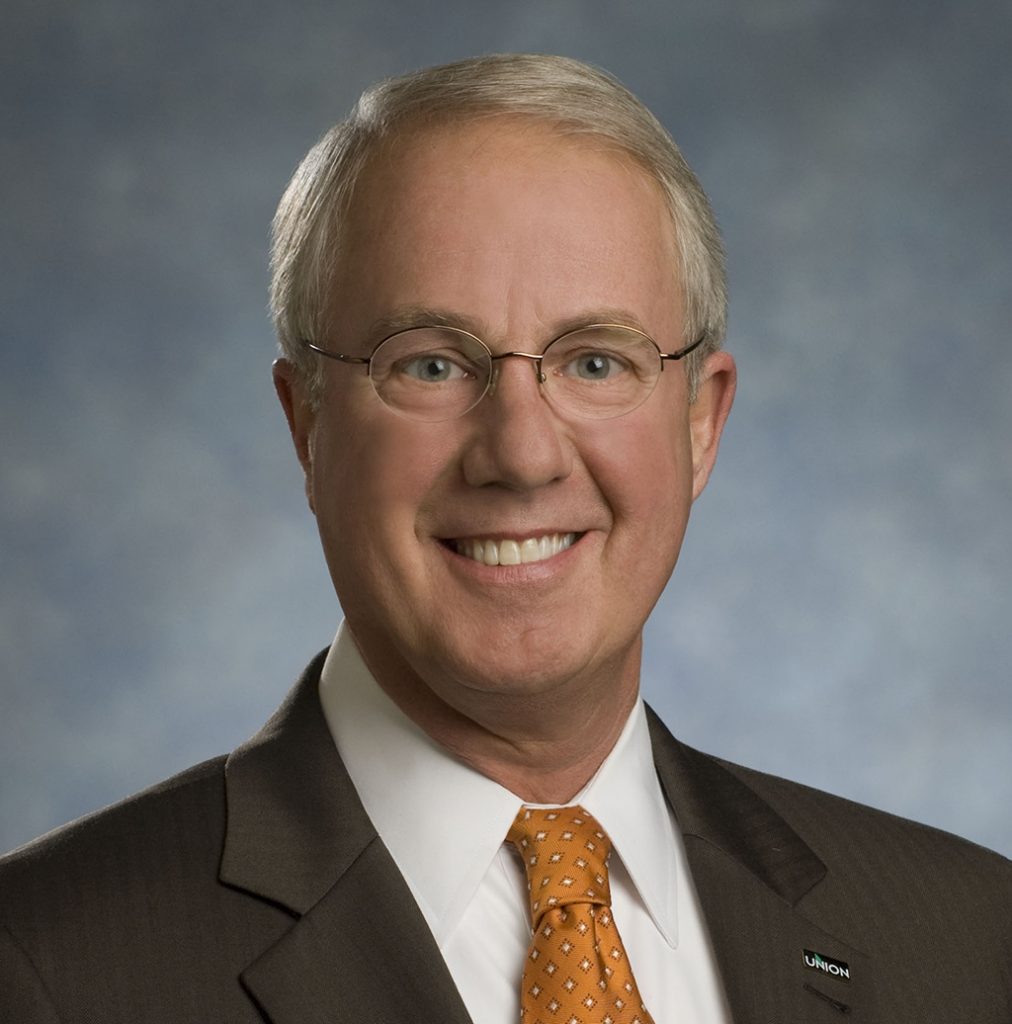The cleanup job continues at Blue Ridge Bank, and it just got nine figures worth of cash to help it get back on track.
The Charlottesville-based bank, which keeps executive offices and a major branch presence in the Richmond region, earlier this month closed on a $150 million capital raise intended to help it get out from under regulatory scrutiny and deal with problem assets that caused it to stumble over the last two years.
Finalized April 3, the raise was led by outside investors Kenneth Lehman, who has a track record of propping up Richmond-area banks in need of capital, and Castle Creek Capital Partners, which also has experience buying into local banks.
Blue Ridge CEO Billy Beale said the capital was sorely needed as the $3 billion bank works to heal itself from damage caused by its previous rapid growth and an overreliance on deposits and loans with fintech companies.
“It was imperative that we got capital in the bank that would give depositors comfort and satisfy regulators,” Beale said. “It’s a big attitudinal change. Everybody is not feeling that weight and now we have certainty that we can do some of the things we needed to do.”
Beale, who was brought in out of retirement last year to help right the ship at Blue Ridge, said the bank’s troubles run a bit deeper than he knew when he first walked in the door last May.
It was no secret at the time that the bank was under a written agreement with its federal regulator. The restrictive document was mainly aimed at forcing the bank to fix problems caused by those fintech relationships, which brought with them customers and cash that were difficult to vet for security purposes.
The fintech companies were all outside firms that were looking for a bank through which to run their customers’ money. Beale said they included firms that operate health savings accounts, those that help truck drivers and general contractors manage and pay their bills, and others that targeted the “underbanked and unbanked.”
At the height of the practice, Blue Ridge had 70 such fintech companies that were accessing its systems for banking. And those 70 companies brought with them over a million customers, Beale said.
“Those million customers were all supposed to be going through the same risk assessment process as a normal individual customer. But some of these businesses opened accounts for foreign nationals, some opened accounts for new immigrants to the U.S. that were not yet citizens,” Beale said. “Those fintechs were supposed to be doing the work and we were supposed to be back checking them. And the bank just got outrun.
“The written agreement was about not having adequate processes for properly vetting the businesses we were doing business with and not handling the volume of customers that were coming on the books according to banking laws.”
Beale said the bank’s previous leadership dove headfirst into those relationships in 2019, seeing them as a new source of deposits and loans. At one point last year those fintech deposits equaled $700 million or about 30 percent of the bank’s total deposits, he said.
“There were those who believed it was going to be easier and cheaper to raise deposits and make loans through these fintechs and that would be the way banking was going,” Beale said.
While the bank has made progress on halting its business with those customers and wiping those loans and deposits off the books, Beale said he has since learned of other legacy issues at Blue Ridge, which he described as more core banking issues.
“There are some other things you find along the way that one would find in a bank that grew very quickly and never paused to grow into its new skin,” he said.
In addition to the rapid influx of fintech money, Blue Ridge in years prior had been on an acquisition streak. It absorbed River Community Bank in Martinsville in 2016 and Louisa-based Virginia Community Bank in 2019. Then came its marriage with Henrico-based Virginia Commonwealth Bank in early 2021, which doubled Blue Ridge’s size overnight and gave it a sizable presence in the Richmond area.

The acquisition of Henrico-based Virginia Commonwealth Bank is what brought Blue Ridge to the Richmond market. (BizSense file)
Later that year it attempted another merger with FVCBankcorp in Northern Virginia, but that deal was killed by regulators in early 2022. That rejection coincided with it being put under written agreement due to the fintech issues.
“It just kept growing and on top of that it layered in the fintech business and that just layered on more complexity into the bank,” Beale said.
All those issues are reflected in the bank’s recent financial performance and that of its share price. The bank posted a loss of $51 million last year, down from a profit of $17 million in 2022 and $52 million in 2021. Its stock closed Friday at $2.61 per share. That’s down 16 percent year-to-date and 88 percent since the bank went public in 2004.
A capital raise was needed for several reasons. First was due to regulatory scrutiny. Following the written agreement, the bank was hit with stricter consent order from the Office of the Comptroller of the Currency in January. It demanded that the bank raise its capital levels and provide the regulator with ongoing liquidity plans.
Blue Ridge also needed extra capital to get out of the fintech business. Beale said the bank has notified all such clients that it is exiting that business and it expects to have all of those related funds off the books by the end of September.
“There are some really good companies in the mix of customers we’re asking to leave and ones that were not causing us issues. But the fastest and least expensive way to get out of that consent order is to exit that business completely,” Beale said.
The bank ultimately found the capital it needed by arranging the raise led by Lehman and Castle Creek. But even that wasn’t without its hiccups.
The bank initially received shareholder approval for the raise last month, only to have it temporarily derailed when a lone shareholder questioned the legitimacy of the tabulation of shareholder votes.
“A large individual shareholder communicated with us that the vote wasn’t accurate and implied he was prepared to go to litigation to keep us from closing,” Beale said. “We still to this day do not know whether that vote count was accurate, but there were enough questions that we felt like the best thing to do was to pivot.”
That pivot involved restructuring the raise in a way that Lehman, Castle Creek and the other investors could provide the $150 million without an initial shareholder vote. That was done using a combination of preferred shares and common stock, with a vote planned for June that will give the investors the rest of the shares they were promised.
Beale said the end result will still be the same as what shareholders voted on last month: Lehman will own approximately 25 percent of Blue Ridge common stock as part of the capital infusion. It will make him the bank’s largest shareholder. Castle Creek, through an affiliate, will own approximately 12.5 of Blue Ridge stock as part of the deal.
Beale said the bank has hired an independent law firm to investigate what happened with last month’s vote and it will hire a new proxy solicitor and outside party to judge to manage the votes in June.
Of the shareholder who called the bank out about the previous vote, Beale said “he’s certainly not accusing the bank of any nefarious activity. In our case we reported the numbers we were given. He just didn’t think the numbers were accurate. He wanted to know what happened and why and be assured it wouldn’t happen in future votes.”
With the capital raise mostly behind it and the fintech issues identified, Beale said the bank will next focus on a bit of old-fashioned banking to get back to more stable footing.
“It is back to making loans and taking deposits in our footprint,” he said. “And come next year we will use the capital to grow the bank.”
Though he came out of retirement to be Blue Ridge’s fixer, Beale, 74, said he knows this assignment will likely last a few years. He said he’s ready for it and has a team in place to help him.
“There have been a lot of good people that have decided they wanted to jump on board and fix Blue Ridge Bank,” he said. “We are making a lot of progress, but we still have a ways to go. I’m in this for a while.”
The cleanup job continues at Blue Ridge Bank, and it just got nine figures worth of cash to help it get back on track.
The Charlottesville-based bank, which keeps executive offices and a major branch presence in the Richmond region, earlier this month closed on a $150 million capital raise intended to help it get out from under regulatory scrutiny and deal with problem assets that caused it to stumble over the last two years.
Finalized April 3, the raise was led by outside investors Kenneth Lehman, who has a track record of propping up Richmond-area banks in need of capital, and Castle Creek Capital Partners, which also has experience buying into local banks.
Blue Ridge CEO Billy Beale said the capital was sorely needed as the $3 billion bank works to heal itself from damage caused by its previous rapid growth and an overreliance on deposits and loans with fintech companies.
“It was imperative that we got capital in the bank that would give depositors comfort and satisfy regulators,” Beale said. “It’s a big attitudinal change. Everybody is not feeling that weight and now we have certainty that we can do some of the things we needed to do.”
Beale, who was brought in out of retirement last year to help right the ship at Blue Ridge, said the bank’s troubles run a bit deeper than he knew when he first walked in the door last May.
It was no secret at the time that the bank was under a written agreement with its federal regulator. The restrictive document was mainly aimed at forcing the bank to fix problems caused by those fintech relationships, which brought with them customers and cash that were difficult to vet for security purposes.
The fintech companies were all outside firms that were looking for a bank through which to run their customers’ money. Beale said they included firms that operate health savings accounts, those that help truck drivers and general contractors manage and pay their bills, and others that targeted the “underbanked and unbanked.”
At the height of the practice, Blue Ridge had 70 such fintech companies that were accessing its systems for banking. And those 70 companies brought with them over a million customers, Beale said.
“Those million customers were all supposed to be going through the same risk assessment process as a normal individual customer. But some of these businesses opened accounts for foreign nationals, some opened accounts for new immigrants to the U.S. that were not yet citizens,” Beale said. “Those fintechs were supposed to be doing the work and we were supposed to be back checking them. And the bank just got outrun.
“The written agreement was about not having adequate processes for properly vetting the businesses we were doing business with and not handling the volume of customers that were coming on the books according to banking laws.”
Beale said the bank’s previous leadership dove headfirst into those relationships in 2019, seeing them as a new source of deposits and loans. At one point last year those fintech deposits equaled $700 million or about 30 percent of the bank’s total deposits, he said.
“There were those who believed it was going to be easier and cheaper to raise deposits and make loans through these fintechs and that would be the way banking was going,” Beale said.
While the bank has made progress on halting its business with those customers and wiping those loans and deposits off the books, Beale said he has since learned of other legacy issues at Blue Ridge, which he described as more core banking issues.
“There are some other things you find along the way that one would find in a bank that grew very quickly and never paused to grow into its new skin,” he said.
In addition to the rapid influx of fintech money, Blue Ridge in years prior had been on an acquisition streak. It absorbed River Community Bank in Martinsville in 2016 and Louisa-based Virginia Community Bank in 2019. Then came its marriage with Henrico-based Virginia Commonwealth Bank in early 2021, which doubled Blue Ridge’s size overnight and gave it a sizable presence in the Richmond area.

The acquisition of Henrico-based Virginia Commonwealth Bank is what brought Blue Ridge to the Richmond market. (BizSense file)
Later that year it attempted another merger with FVCBankcorp in Northern Virginia, but that deal was killed by regulators in early 2022. That rejection coincided with it being put under written agreement due to the fintech issues.
“It just kept growing and on top of that it layered in the fintech business and that just layered on more complexity into the bank,” Beale said.
All those issues are reflected in the bank’s recent financial performance and that of its share price. The bank posted a loss of $51 million last year, down from a profit of $17 million in 2022 and $52 million in 2021. Its stock closed Friday at $2.61 per share. That’s down 16 percent year-to-date and 88 percent since the bank went public in 2004.
A capital raise was needed for several reasons. First was due to regulatory scrutiny. Following the written agreement, the bank was hit with stricter consent order from the Office of the Comptroller of the Currency in January. It demanded that the bank raise its capital levels and provide the regulator with ongoing liquidity plans.
Blue Ridge also needed extra capital to get out of the fintech business. Beale said the bank has notified all such clients that it is exiting that business and it expects to have all of those related funds off the books by the end of September.
“There are some really good companies in the mix of customers we’re asking to leave and ones that were not causing us issues. But the fastest and least expensive way to get out of that consent order is to exit that business completely,” Beale said.
The bank ultimately found the capital it needed by arranging the raise led by Lehman and Castle Creek. But even that wasn’t without its hiccups.
The bank initially received shareholder approval for the raise last month, only to have it temporarily derailed when a lone shareholder questioned the legitimacy of the tabulation of shareholder votes.
“A large individual shareholder communicated with us that the vote wasn’t accurate and implied he was prepared to go to litigation to keep us from closing,” Beale said. “We still to this day do not know whether that vote count was accurate, but there were enough questions that we felt like the best thing to do was to pivot.”
That pivot involved restructuring the raise in a way that Lehman, Castle Creek and the other investors could provide the $150 million without an initial shareholder vote. That was done using a combination of preferred shares and common stock, with a vote planned for June that will give the investors the rest of the shares they were promised.
Beale said the end result will still be the same as what shareholders voted on last month: Lehman will own approximately 25 percent of Blue Ridge common stock as part of the capital infusion. It will make him the bank’s largest shareholder. Castle Creek, through an affiliate, will own approximately 12.5 of Blue Ridge stock as part of the deal.
Beale said the bank has hired an independent law firm to investigate what happened with last month’s vote and it will hire a new proxy solicitor and outside party to judge to manage the votes in June.
Of the shareholder who called the bank out about the previous vote, Beale said “he’s certainly not accusing the bank of any nefarious activity. In our case we reported the numbers we were given. He just didn’t think the numbers were accurate. He wanted to know what happened and why and be assured it wouldn’t happen in future votes.”
With the capital raise mostly behind it and the fintech issues identified, Beale said the bank will next focus on a bit of old-fashioned banking to get back to more stable footing.
“It is back to making loans and taking deposits in our footprint,” he said. “And come next year we will use the capital to grow the bank.”
Though he came out of retirement to be Blue Ridge’s fixer, Beale, 74, said he knows this assignment will likely last a few years. He said he’s ready for it and has a team in place to help him.
“There have been a lot of good people that have decided they wanted to jump on board and fix Blue Ridge Bank,” he said. “We are making a lot of progress, but we still have a ways to go. I’m in this for a while.”




